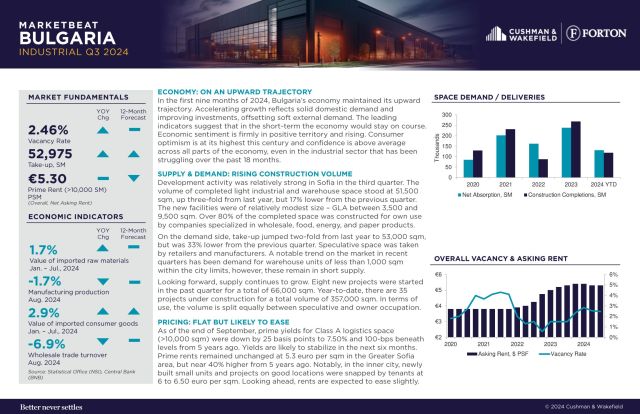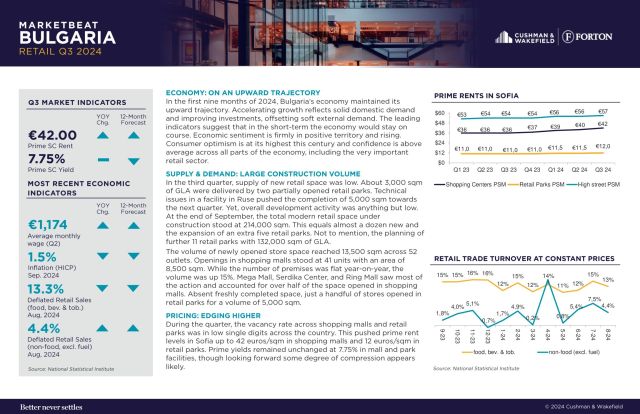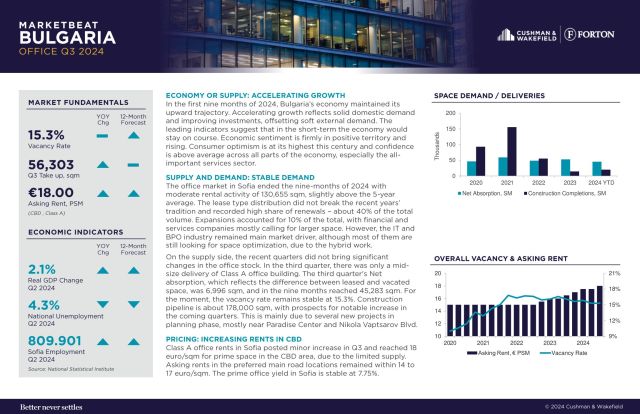Investment market is slowing down while rental market recovers
Despite the uncertainty in the market, office space has seen a smooth recovery in terms of leasing activity and remains the most solid investment asset. This is according to the analysis of commercial real estate advisory company Cushman & Wakefield Forton for the first half of 2022. The company also notes activity in the retail space segment, as well as continued interest in acquiring and developing logistics projects.
“Office transactions dominated the entire CEE region in the first half of the year as they offered relative stability amid the general uncertainty” noted Yavor Kostov, Managing Partner at Cushman & Wakefield Forton.
Cushman & Wakefield’s data for the region also shows a significant prevalence of investment acquisitions of office projects over others. According to the group’s statistics, in the first quarter of 2022 they accounted for almost 44% of the total market volume, compared to 36% for retail space and only 13% share for industrial and logistics transactions. Total investment acquisitions for the region for the period amount to EUR 2.8 billion.
“It is important to note that in recent quarters we have seen an increasing number of transactions with complete portfolios of properties in all segments of the market. This is a result of the consolidation of ownership in previous years when investment activity was dominated by single-asset transactions” said Yavor Kostov.
In recent months there has been a tendency for buyers to make harder decisions, which has led to a slowdown in investment activity in Central and Eastern Europe. This is a result of the war in Ukraine, general uncertainty, and the gradual rise in interest rates.
Similar developments, albeit delayed, are expected in Bulgaria. In the first quarter of 2022, the Bulgarian market saw relatively weak activity with a total transaction volume of just over EUR 36 million. The larger transactions were in the office and retail segments.
The most notable trend is the gradual recovery of the office market, supported by the return-to-office policy of large companies calling employees back to the workplace. In the first quarter of 2022, leasing activity in Bulgaria saw significant growth compared to previous years with signed leases and lease renewals for a total of 44,032 sqm. The largest transaction for the period was the renewal of Thermo Fisher’s 9,000 sqm lease in Megapark brokered by Cushman & Wakefield Forton.
The office market is going through a noticeable transformation, related to the introduction of the hybrid work model, the optimization of leased space and the increasing penetration of flexible office solutions. The main driver is the new way in which companies globally organise their workflow and the activities of their teams. For them, the office is no longer just a place to work, but a space to socialise, exchange ideas, network and bring employees together.
“The tenants now have a very different profile compared to two years ago. Because of the hybrid model of work they are looking for reorganization of the occupied space and more often – a combination of standard office and shared workspaces, which allows them to be flexible,” said Yordan Krastev, Office Space Manager at Cushman & Wakefield Forton.
In view of this trend, Cushman & Wakefield Forton’s expectations are that co-working spaces will gradually become an integral part of the space mix of large office projects in Sofia. Currently this type of space in the capital is approaching 50,000 sqm. The latest project is My Flex Coworking, which opened 2,400 sqm in Megapark and is managed by Cushman & Wakefield Forton.
The profile of shared office space tenants is also changing. These are no longer mainly start-ups or freelancers, but also conventional, established or growing companies. On one hand, in the co-working space and serviced offices, they are finding flexibility beyond the standard 5-year leases on the market. On the other hand, costs in shared spaces are more easily optimized as tenants do not have a commitment to furniture, equipment and supplies and simultaneously rely on the rotational principle of operation, which allows them to maintain fewer work stations than the number of employees.
Another current trend in the co-working space, according to him, is that the average term of contracts is increasing. “If they used to be signed month-to-month, today tenants commit to the space they need for half, one, even two years. In large part, this is due to companies seeking to provide more predictability for their business and to able to better plan processes,” he added.
RELATED INSIGHTS
CAN’T FIND WHAT YOU’RE LOOKING FOR?
Get in touch with one of our professionals.




